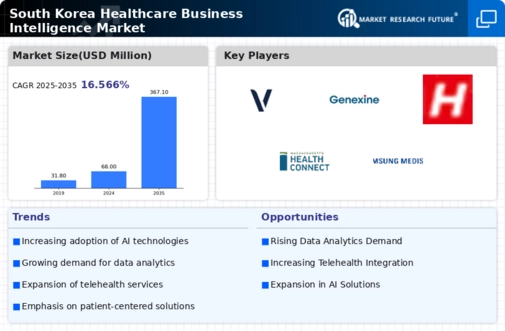Rising Demand for Data Analytics
The healthcare business-intelligence market in South Korea experiences a notable surge in demand for data analytics solutions. This trend is driven by healthcare providers seeking to enhance operational efficiency and improve patient outcomes. As of 2025, the market is projected to grow at a CAGR of approximately 12%, reflecting the increasing reliance on data-driven insights. Healthcare organizations are investing in advanced analytics tools to streamline processes, reduce costs, and optimize resource allocation. The integration of predictive analytics is particularly significant, as it enables providers to anticipate patient needs and manage chronic diseases more effectively. Consequently, the healthcare business-intelligence market is evolving to meet these demands, fostering innovation and improving the overall quality of care.
Government Initiatives and Support
Government initiatives play a crucial role in shaping the healthcare business-intelligence market in South Korea. The South Korean government has implemented various policies aimed at promoting digital transformation within the healthcare sector. These initiatives include funding for research and development, as well as incentives for healthcare organizations to adopt advanced technologies. In 2025, the government allocates approximately $200 million to support the integration of business intelligence solutions in healthcare facilities. This financial backing encourages the adoption of data analytics and business intelligence tools, ultimately enhancing the quality of healthcare services. As a result, the healthcare business-intelligence market is likely to witness accelerated growth, driven by supportive regulatory frameworks and funding opportunities.
Increased Focus on Cost Management
Cost management is becoming increasingly critical within the healthcare business-intelligence market. As healthcare expenditures continue to rise, organizations in South Korea are compelled to seek innovative solutions to control costs while maintaining high-quality care. The implementation of business intelligence tools allows healthcare providers to analyze spending patterns, identify inefficiencies, and optimize resource allocation. In 2025, it is projected that healthcare organizations will allocate approximately 20% of their budgets to business intelligence initiatives aimed at cost reduction. This focus on financial sustainability is likely to drive the adoption of advanced analytics and reporting tools, enabling organizations to make informed decisions. Consequently, the healthcare business-intelligence market is poised for growth as providers prioritize cost management strategies.
Integration of Interoperable Systems
The integration of interoperable systems is a pivotal driver in the healthcare business-intelligence market. South Korea's healthcare landscape is characterized by a diverse array of systems and technologies, necessitating seamless data exchange for effective decision-making. The push for interoperability is driven by the need to consolidate patient data from various sources, enabling healthcare providers to gain comprehensive insights. As of 2025, approximately 40% of healthcare organizations are expected to prioritize interoperability initiatives, recognizing its potential to enhance care coordination and patient outcomes. This trend is likely to stimulate the demand for business intelligence solutions that facilitate data integration and analysis. Thus, the healthcare business-intelligence market is evolving to support these interoperability efforts, ultimately improving the efficiency of healthcare delivery.
Growing Emphasis on Regulatory Compliance
In the context of the healthcare business-intelligence market, regulatory compliance emerges as a significant driver. South Korean healthcare organizations are increasingly required to adhere to stringent regulations regarding data privacy and security. The implementation of the Personal Information Protection Act (PIPA) necessitates robust data management practices, compelling organizations to invest in business intelligence solutions that ensure compliance. As of 2025, it is estimated that compliance-related investments account for nearly 15% of total expenditures in the healthcare sector. This focus on regulatory adherence not only mitigates risks but also enhances the credibility of healthcare providers. Consequently, the healthcare business-intelligence market is adapting to these compliance requirements, fostering the development of secure and efficient data management systems.
















Leave a Comment